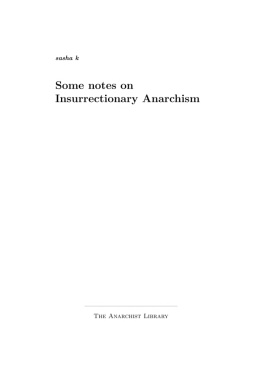Sasha K - The Anarchist Library: sasha k Some notes on Insurrectionary Anarchism a4
Here you can read online Sasha K - The Anarchist Library: sasha k Some notes on Insurrectionary Anarchism a4 full text of the book (entire story) in english for free. Download pdf and epub, get meaning, cover and reviews about this ebook. genre: Politics. Description of the work, (preface) as well as reviews are available. Best literature library LitArk.com created for fans of good reading and offers a wide selection of genres:
Romance novel
Science fiction
Adventure
Detective
Science
History
Home and family
Prose
Art
Politics
Computer
Non-fiction
Religion
Business
Children
Humor
Choose a favorite category and find really read worthwhile books. Enjoy immersion in the world of imagination, feel the emotions of the characters or learn something new for yourself, make an fascinating discovery.
The Anarchist Library: sasha k Some notes on Insurrectionary Anarchism a4: summary, description and annotation
We offer to read an annotation, description, summary or preface (depends on what the author of the book "The Anarchist Library: sasha k Some notes on Insurrectionary Anarchism a4" wrote himself). If you haven't found the necessary information about the book — write in the comments, we will try to find it.
Sasha K: author's other books
Who wrote The Anarchist Library: sasha k Some notes on Insurrectionary Anarchism a4? Find out the surname, the name of the author of the book and a list of all author's works by series.
The Anarchist Library: sasha k Some notes on Insurrectionary Anarchism a4 — read online for free the complete book (whole text) full work
Below is the text of the book, divided by pages. System saving the place of the last page read, allows you to conveniently read the book "The Anarchist Library: sasha k Some notes on Insurrectionary Anarchism a4" online for free, without having to search again every time where you left off. Put a bookmark, and you can go to the page where you finished reading at any time.
Font size:
Interval:
Bookmark:

This book was produced in EPUB format by the Internet Archive.
The book pages were scanned and converted to EPUB format automatically. This process relies on optical character recognition, and is somewhat susceptible to errors. The book may not offer the correct reading sequence, and there may be weird characters, non-words, and incorrect guesses at structure. Some page numbers and headers or footers may remain from the scanned page. The process which identifies images might have found stray marks on the page which are not actually images from the book. The hidden page numbering which may be available to your ereader corresponds to the numbered pages in the print edition, but is not an exact match; page numbers will increment at the same rate as the corresponding print edition, but we may have started numbering before the print book's visible page numbers. The Internet Archive is working to improve the scanning process and resulting books, but in the meantime, we hope that this book will be useful to you.
The Internet Archive was founded in 1996 to build an Internet library and to promote universal access to all knowledge. The Archive's purposes include offering permanent access for researchers, historians, scholars, people with disabilities, and the general public to historical collections that exist in digital format. The Internet Archive includes texts, audio, moving images, and software as well as archived web pages, and provides specialized services for information access for the blind and other persons with disabilities.
Created with abbyy2epub (v.1.7.6)
Contents
1. The State Will Not Just Disappear; Attack 3
2. Self-Activity versus managed revolt: from insurrection to revolution 3
3. Uncontrollability versus managed revolt: the spread of attack 4
4. Permanent conflictuality versus mediation with institutional forces 4
5. Illegality; insurrection isn't just robbing banks 5
6. Informal Organization; not professional revolutionaries or activists, not permanent organizations 5
7. The individual and the social: individualism and communism, a false problem 6
8. We are the exploited, we are the contradiction: this is no time for waiting 7
Insurrectionary anarchism is not an ideological solution to all social problems, a commodity on the capitalist market of ideologies and opinions, but an on-going praxis aimed at putting an end to the domination of the state and the continuance of capitalism, which requires analysis and discussion to advance. We don't look to some ideal society or offer an image of utopia for public consumption. Throughout history, most anarchists, except those who believed that society would evolve to the point that it would leave the state behind, have been insurrectionary anarchists. Most simply, this means that the state will not merely wither away, thus anarchists must attack, for waiting is defeat; what is needed is open mutiny and the spreading of subversion among the exploited and excluded. Here we spell out some implications that we and some other insurrectionary anarchists draw from this general problem: if the state will not disappear on its own, how then do we end its existence? It is, therefore, primarily a practice, and focuses on the organization of attack. These notes are in no way a closed or finished product; we hope they are a part of an ongoing discussion, and we most certainly welcome responses. Much of this comes straight from past issues of Insurrection and pamphlets from Elephant Editions, available from the addresses at the end.
1. The State Will Not Just Disappear; Attack
The State of capital will not "wither away," as it seems many anarchists have come to believe not only entrenched in abstract positions of 'waiting,' but some even openly condemning the acts of those for whom the creation of the new world depends on the destruction of the old. Attack is the refusal of mediation, pacification, sacrifice, accommodation, and compromise.
It is through acting and learning to act, not propaganda, that we will open the path to insurrection, although propaganda has a role in clarifying how to act. Waiting only teaches waiting; in acting one learns to act.
The force of an insurrection is social, not military. The measure for evaluating the importance of a generalized revolt is not the armed clash, but on the contrary the amplitude of the paralysis of the economy, of normality.
2. Self-Activity versus managed revolt: from insurrection to revolution
As anarchists, the revolution is our constant point of reference, no matter what we are doing or what problem we are concerned with. But the revolution is not a myth simply to be used as a point of reference. Precisely because it is a concrete event, it must be built daily through more modest attempts which do not have all the liberating characteristics of the social revolution in the true sense. These more modest attempts are insurrections. In them the uprising of the most exploited and excluded of society and the most politically sensitized minority opens the way to the possible involvement of increasingly wider strata of exploited on a flux of rebellion which could lead to revolution.
Struggles must be developed, both in the intermediate and long term. Clear strategies are necessary to allow different methods to be used in a coordinated and fruitful way.
Autonomous action: the self-management of struggle means that those that struggle are autonomous in their decisions and actions; this is the opposite of an organization of synthesis which always attempts to take control of struggle. Struggles that are synthesized within a single controlling organization are easily integrated into the power structure of present society. Self-organized struggles are by nature uncontrollable when they are spread across the social terrain.
3. Uncontrollability versus managed revolt: the spread of attack
It is never possible to see the outcome of a specific struggle in advance. Even a limited struggle can have the most unexpected consequences. The passage from the various insurrections limited and circumscribed to revolution can never be guaranteed in advance by any method.
What the system is afraid of is not these acts of sabotage in themselves, so much as their spreading socially. Every proletarianized individual who disposes of even the most modest means can draw up his or her objectives, alone or along with others. It is materially impossible for the State and capital to police the apparatus of control that operates over the whole social territory. Anyone who really wants to contest the network of control can make their own theoretical and practical contribution. The appearance of the first broken links coincides with the spreading of acts of sabotage. The anonymous practice of social self-liberation could spread to all fields, breaking the codes of prevention put into place by power.
Small actions, therefore, easily reproducible, requiring unsophisticated means that are available to all, are by their very simplicity and spontaneity uncontrollable. They make a mockery of even the most advanced technological developments in counter-insurgency.
4. Permanent conflictuality versus mediation with institutional forces
Conflictuality should be seen as a permanent element in the struggle against those in power. A struggle which lacks this element ends up pushing us towards mediating with the institutions, grows accustomed to the habits of delegating and believing in an illusory emancipation carried out by parliamentary decree, to the very point of actively participating in our own exploitation ourselves.
Next pageFont size:
Interval:
Bookmark:
Similar books «The Anarchist Library: sasha k Some notes on Insurrectionary Anarchism a4»
Look at similar books to The Anarchist Library: sasha k Some notes on Insurrectionary Anarchism a4. We have selected literature similar in name and meaning in the hope of providing readers with more options to find new, interesting, not yet read works.
Discussion, reviews of the book The Anarchist Library: sasha k Some notes on Insurrectionary Anarchism a4 and just readers' own opinions. Leave your comments, write what you think about the work, its meaning or the main characters. Specify what exactly you liked and what you didn't like, and why you think so.












